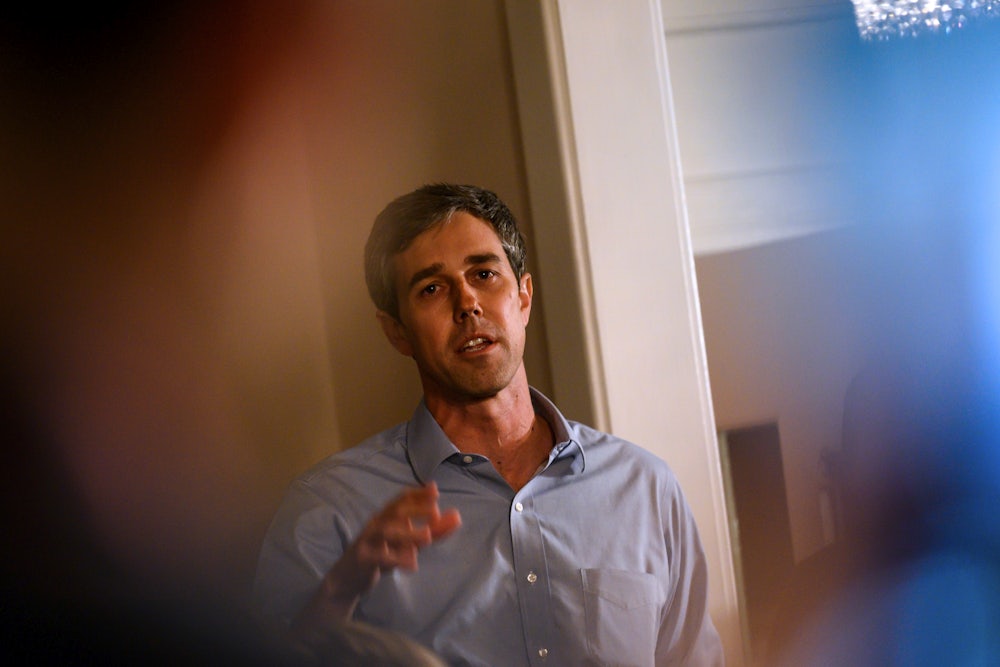Beto O’Rourke released the first significant policy proposal of his presidential campaign on Monday. “Climate change is the greatest threat we face—one which will test our country, our democracy, and every single one of us,” begins his ambitious plan to fight climate change. “The stakes are clear: We are living in a transformed reality, where our longstanding inaction has not only impacted our climate but led to a growing emergency that has already started to sap our economic prosperity and public health—worsening inequality and threatening our safety and security.”
O’Rourke’s plan isn’t quite as ambitious as the Green New Deal, but O’Rourke is the first prominent 2020 candidate to create his own proposal to address the crisis as opposed to merely backing the GND, as Bernie Sanders, Elizabeth Warren, and Pete Buttigeig have done. Let the intra-party climate debate begin!
Seriously, everyone should be excited about this.
The two plans have a lot in common, but there’s a fundamental difference. Proponents of the Green New Deal approach climate change as an issue caused inherently by unchecked capitalism and the fossil fuel industry, and thus seek to vanquish—or at least, aggressively subdue—those enemies. O’Rourke does not expressly demonize either. In his plan, climate change itself is the enemy.
But first, the similarities. The Green New Deal calls for the economy to decarbonize by 2030. O’Rourke’s plan calls for an economy with net zero emissions by 2050. The latter goal is what climate scientists say is necessary worldwide to avoid warming of 1.5 degrees Celsius, the point at which irreversible catastrophe begins. So both plans are in line with the latest science—though the Green New Deal proposes the U.S. finish its transition with time to spare, in order to lead the way for the rest of the world.
Both O’Rourke’s plan and the Green New Deal are economic stimulus plans with a focus on justice: They propose a massive public investment for a clean energy economy, and insist that much of those funds be directed toward underserved and marginalized communities. O’Rourke’s plan, specifically, calls for a $5 trillion investment over 10 years to fund renewable infrastructure, various grant programs, and new technology research. Like the Green New Deal, his plan calls for reinstating greenhouse gas regulations dismantled by President Donald Trump, and building upon them. Both plans also call for halting new fossil fuel development on public lands. And neither plan calls for a carbon tax—or any price on carbon.
Beto's climate plan looks a lot like the Obama-era Recovery Act. The majority of the $5 trillion in investments he's talking about are in the form of tax credits and loans. But there's no price on carbon per se. https://t.co/JwLeqSUJzM pic.twitter.com/9sqnlmW5FX
— Humor Or Fun (@umairfan) April 29, 2019
The Green New Deal proposal introduced by Alexandria Ocasio-Cortez doesn’t specifically call for an end to the fossil fuel industry or capitalism. But allowing the fossil fuel industry to persist is “not what we’re shooting for,” Ocasio-Cortez’s spokesperson told Politico in February. As Democratic presidential candidates who support the Green New Deal argue, solving climate change will require taking power away from the fossil fuel industry.
Climate change is a planetary crisis. Our task is clear. We must take on the fossil fuel industry that's largely responsible for global emissions and accelerate our transition toward energy efficiency and sustainable energy sources. https://t.co/661WsIZJYt
— Bernie Sanders (@BernieSanders) October 10, 2018
Saving our planet should not be a partisan issue. Putting our kids' and grandkids' futures over today's fossil fuel profits should not be a hard choice to make. We need to treat global climate change like the urgent, existential threat that it is, and act accordingly. pic.twitter.com/XlTw0VzDg3
— Kirsten Gillibrand (@SenGillibrand) March 26, 2019
O’Rourke’s plan avoids such rhetoric. It doesn’t include those social policies of the Green New Deal that rein in capitalism, and seeks instead to “harness the power of the market, but also recognize that the market needs rules in order to function equitably and efficiently—not just incentives, but accountability too.” It also does not demonize the fossil fuel industry, though it does call for “stopping new fossil fuel leases” on public lands and ending “the tens of billions of dollars of tax breaks currently given to fossil fuel companies.”
These differences between the Green New Deal and O’Rourke’s plan reflect a larger debate within the Democratic Party about how to approach climate change, as Robinson Meyer wrote for The Atlantic: “whether to treat the fossil-fuel industry like it once treated the tobacco industry—as an evil enterprise and political enemy—or like it now treats the pharmaceutical industry—as an important part of the economy that must be tamed and transformed.” O’Rourke’s past actions have suggested the latter. He was the second-highest recipient of money from the oil and gas sector last year, and recently declined to sign the No Fossil Fuel Money pledge, which states that candidates won’t take money from fossil fuel lobbyists, PACs, and executives.
These moves have created distrust of O’Rourke on the left, particularly among climate activists. His new plan is perhaps an attempt to appease those skeptics, and he certainly deserves credit for making climate change a central, if not the central, issue in his campaign. But will that be enough for voters who agree that this is “the greatest threat we face,” when other Democrats already support a popular and more ambitious plan to do something about it?
